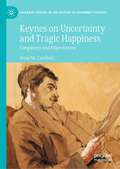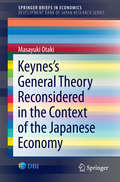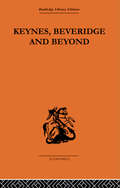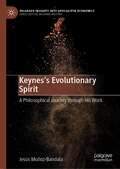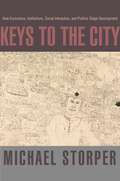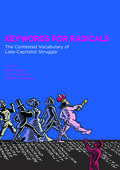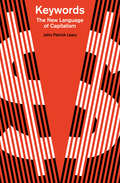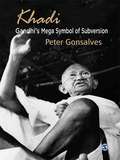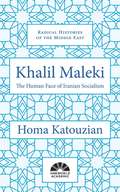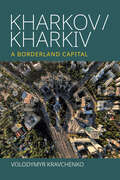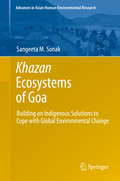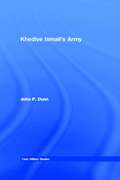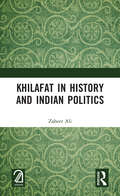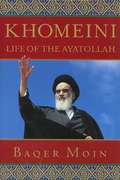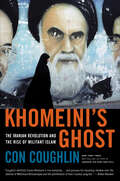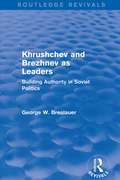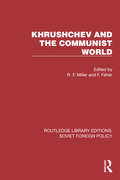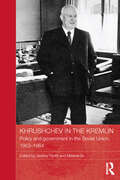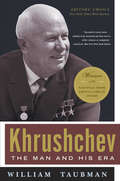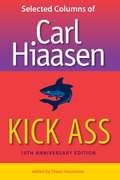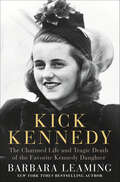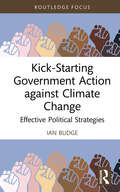- Table View
- List View
Keynes on Uncertainty and Tragic Happiness: Complexity and Expectations (Palgrave Studies in the History of Economic Thought)
by Anna M. CarabelliMost economists who read the General Theory candidly admitted that they could not understand the theoretical apparatus and found it easy to recast it in traditional terms. This book provides a masterful guide to the generally unrecognized methodological revolution that supported the new theoretical concepts -- a veritable lodestone that complements and expands understanding on the treatment of the economic magnitudes appropriate to the ideal of generality in the social sciences, to the applicability of probability, to the formulation of decision-making under uncertainty, and the foundations of economic policy in interdependent economic systems. _Jan Kregel, Levy Economics InstituteAnna Carabelli sets out Keynes’s understanding of economics as a way of thinking, encompassing method and morals, rather than as a doctrine. She does so with her customary admirable scholarship and also her willingness to take controversial positions. I commend the volume most highly to Keynes scholars as a drawing-together and development of the themes that Carabelli has pursued since the publication of her 1988 classic, On Keynes’s Method. Further Keynes’s approach was designed to be applied to different contexts, so I enthusiastically recommend the volume also as a foundation and guide for anyone open to such a ‘new way of reasoning in economics’ for the modern era. _Sheila Dow, University of Stirling This book examines the philosophy and methodology of Keynes, highlighting its novelty and how it presented a new form of economic reasoning. Exploring Keynes’s use of non-demonstrative logic, based on probability, commonalities are found in his economics, ethics, aesthetics, and international relations. Insights are provided into his reasoning and his approach to uncertainty, rationality, measurability of complex magnitudes, moral and rational dilemmas, and irreducible conflicts.This book investigates methodological continuity within Keynes’s work, in particular in relation to uncertainty, complexity, incommensurability, happiness and openness. It will be relevant to students and researchers interested in Keynes, probability, ambiguity, ethics and the history of economic thought.
Keynes's General Theory Reconsidered in the Context of the Japanese Economy
by Masayuki OtakiThis book reconsiders Keynes's The General Theory of Employment, Interest and Money and establishes a new interpretation. In contrast to the existing models, this book finds that the stickiness in the nominal wage is not crucial for his theory. Moreover, the author has also succeeds in capturing the concept of liquidity in a rigorous mathematical model. In conjunction with the development of the concept of liquidity, the separation of the decision between savings and capital investment, which plays a key role in the principle of effective demand and denies Say's law, is exactly and originally formulated. The theory thus developed is applicable to elucidating some serious political economic causes that entrap the long-stagnated Japanese economy. For example, an analytical explanation is provided about why disinflation/deflation incessantly progresses despite the exorbitant expansionary monetary policy (ijigen kin-yuu seisaku) by the Bank of Japan. This phenomenon is an unsolvable question from the quantity-theoretic approaches (e. g. , monetarism and new Keynesianism) which, although they differ in assumptions concerning the length of adjustment periods, commonly assume that the price level sooner or later rises in proportion to the quantity of money. Owing much to Keynes, the author's approach considers that the price level is mainly governed by its marginal prime cost which is equal to the nominal wage as a first approximation. As such, the drastically sagging wages during the past 10 years provoke serious disinflation/deflation. It should be noted that this discussion never depends on the quantity of money.
Keynes, Beveridge and Beyond (Routledge Library Editions)
by John Williams Karel Williams Tony CutlerPresenting a coherent interpretation of the development of economic and social policy in Britain since 1945, this book analyses the political assumptions underlying post-war economic policy. It traces these assumptions through the classic texts of Keynes and Beveridge, the architects of limited, non-socialist state intervention to secure the welfare state and full employment. Topics covered include:* 'Private saving' versus company pensions* The level and composition of employment in Britain
Keynes’s Evolutionary Spirit: A Philosophical Journey through His Work (Palgrave Insights into Apocalypse Economics)
by Jesús Muñoz-BandalaThis book chronicles the way Keynes’s generous philosophy of practice evolved in consonance with the needs of his epoch. From a youngster reflecting on ethics and the classics, to becoming a leading voice in both wars in terms of political philosophy and international relations, to playing the role of innovator in both probability and economics, to taking a stance as an art appreciator, Keynes’s life and multidisciplinary contributions to humankind were permeated by his philosophical milieu. However, only a flexible, dynamic, and broad philosophy could have reflected and led the economic and political events in the world of the first part of the 20th Century, which is what Keynes managed to accomplish, and that is what the book suggests. This book captures the gist of Keynes’ evolutionary philosophy for our times. The book adds an evolutionary perspective to the existing literature on Keynes. As a case in point, the theoretical foundations of both macroeconomics and laissez faire are dissected. But the book also tells the story of how Keynes’s philosophy is adapted to a convulsed world, which is akin to ours, his legacy being gifted with multiple human considerations. The book offers an outline of Keynes’s philosophical stance—also compared with those of other European thinkers—at a moment when new ethical, epistemological, economic, and political perspectives are required, especially after the crisis of 2020. The conclusion is that Keynes´s theoretical and practical insights were far ahead of his time.
Keys to the City: How Economics, Institutions, Social Interaction, and Politics Shape Development
by Michael StorperWhy do some cities grow economically while others decline? Why do some show sustained economic performance while others cycle up and down? In Keys to the City, Michael Storper, one of the world's leading economic geographers, looks at why we should consider economic development issues within a regional context--at the level of the city-region--and why city economies develop unequally. Storper identifies four contexts that shape urban economic development: economic, institutional, innovational and interactional, and political. The book explores how these contexts operate and how they interact, leading to developmental success in some regions and failure in others. Demonstrating that the global economy is increasingly driven by its major cities, the keys to the city are the keys to global development. In his conclusion, Storper specifies eight rules of economic development targeted at policymakers. Keys to the City explains why economists, sociologists, and political scientists should take geography seriously.
Keystroke Capitalism: How Banks Create Money for the Few
by Aaron SahrWhy society needs to reclaim the power to create moneyAt the heart of capitalism lies the ability of private banks to create money at the stroke of a key. Why have we ignored this unique privilege for so long – and at what cost? Aaron Sahr attributes the lack of attention paid to money creation to the core of popular theories of capitalism, which equate economic power with capital ownership. This conceptual framework obscures the real drivers of capitalist dynamics as well as the causes of increasing inequality. By exploring the transformation of banking over the last half century, Sahr shows how the creation of money has driven the rise of finance as well as splitting incomes from wealth. As a result, the real economy of ordinary people has become a debt supplier to a monetary system whose returns accumulate at the top. It is not simply the markets but money itself that transfers wealth from the masses to a minority. Increasing financial inequality can therefore only be remedied by addressing predistribution – the modalities of money creation – as well as the distributive effects of the markets. By mapping this hidden regime of &‘keystroke capitalism&’, Sahr makes an essential contribution to our understanding of economic inequality and capitalist dynamics.
Keywords for Radicals: The Contested Vocabulary of Late-Capitalist Struggle
by A. K. Thompson Joy James Kelly Fritsch Clare O'Connor Silvia Federici"An extraordinary volume that provides nothing less than a detailed cognitive mapping of the terrain for everyone who wants to engage in radical politics. "—Slavoj Žižek, author of Living in the End Times "From its thought-provoking Introduction though its energizing accounts of the tensions underlying our most prized concepts, Keywords for Radicals will be indispensable to any scholar or activist who is serious about critique and change. "—Stephen Duncombe, editor of Cultural Resistance Reader In Keywords (1976), Raymond Williams devised a "vocabulary" that reflected the vast social transformations of the post-war period. He revealed how these transformations could be grasped by investigating changes in word usage and meaning. Keywords for Radicals—part homage, part development—asks: What vocabulary might illuminate the social transformations marking our own contested present? How do these words define the imaginary of today's radical left? With insights from dozens of scholars and troublemakers, Keywords for Radicals explores the words that shape our political landscape. Each entry highlights a term's contested variations, traces its evolving usage, and speculates about what its historical mutations can tell us. More than a glossary, this is a crucial study of the power of language and the social contradictions hidden within it. Contributors include Patrick Bond, Silvia Federici, John Bellamy Foster, Joy James, Ilan Pappé, Justin Podur, Nina Power, Mab Segrest, and more. Kelly Fritsch is a Banting Postdoctoral Fellow in Women's and Gender Studies at the University of Toronto. Clare O'Connor is a doctoral student in Communication at the University of Southern California. A. K. Thompson teaches social theory at Fordham University in New York.
Keywords in Education Policy Research: A Conceptual Toolbox
by Nelli Piattoeva Andrew Wilkins Steven J. CourtneyThe field of education policy research is a dense, crowded space owing to its complicated relationship to different intellectual histories and the influence of various ontologies or ‘turns’. To aid comprehension and clarity, this book describes the history, contribution and application of over 90 keywords in the field of education policy research. It is designed as a reference, learning and teaching tool to assist students, educators and researchers with: • complex learning and teaching; • wider and background reading and knowledge building; • critical scholarship and research; • interdisciplinary thinking and writing; and • theory development and application.
Keywords: The New Language of Capitalism
by John Patrick Leary&“A clever, even witty examination of the manipulation of language in these days of neoliberal or late stage capitalism&” (Counterpunch). From Silicon Valley to the White House, from kindergarten to college, and from the factory floor to the church pulpit, we are all called to be innovators and entrepreneurs, to be curators of an ever-expanding roster of competencies, and to become resilient and flexible in the face of the insults and injuries we confront at work. In the midst of increasing inequality, these keywords teach us to thrive by applying the lessons of a competitive marketplace to every sphere of life. What&’s more, by celebrating the values of grit, creativity, and passion at school and at work, they assure us that economic success is nothing less than a moral virtue. Organized alphabetically as a lexicon, Keywords explores the history and common usage of major terms in the everyday language of capitalism. Because these words have infiltrated everyday life, their meanings may seem self-evident, even benign. Who could be against empowerment, after all? Keywords uncovers the histories of words like innovation, which was once synonymous with &“false prophecy&” before it became the prevailing faith of Silicon Valley. Other words, like best practices and human capital, are relatively new coinages that subtly shape our way of thinking. As this book makes clear, the new language of capitalism burnishes hierarchy, competition, and exploitation as leadership, collaboration, and sharing, modeling for us the habits of the economically successful person: be visionary, be self-reliant—and never, ever stop working.
Khadi: Gandhi's Mega Symbol of Subversion
by Peter GonsalvesKhadi: Gandhi`s Mega Symbol of Subversion investigates the power of a symbol to qualitatively transform society by studying Mahatma Gandhi's use of clothing as a metaphor for unity, empowerment and liberation from imperial subjugation. The book brings together historical evidence of Gandhi's search for a semiotics of attire in his quest for personal integrity and socio-political change. From a multidisciplinary perspective, it closely examines the subversion underlying his sartorial communication. The author also discusses the complex challenges in Gandhi's highly polarized environment, such as the conflict between the British Empire and the Indian National Congress, Hindu-Muslim tensions, the urban-rural divide, and the question of untouchability. The author examines the symbolic potential for change which khadi has, not merely as 'revolution' or 'sedition', but as a sustained, well-organised strategy for achieving full independence or purna swaraj.
Khalil Maleki: The Human Face of Iranian Socialism (Radical Histories of the Middle East)
by Homa KatouzianKhalil Maleki (1901–1969) was a selfless campaigner for democracy and social welfare in twentieth-century Iran. His was a unique approach to politics, prioritising the criticism of policies detrimental to his country&’s development over the pursuit of power itself. An influential figure, he was at the centre of such formative events as the split of the communist Tudeh party, and the 1953 coup and its aftermath. In an age of intolerance and uncompromising confrontation, Maleki remained an indefatigable advocate for open discussion and peaceful reform – a stance that saw him jailed several times. This work makes a compelling case for him to be regarded among the foremost thinkers of his generation.
Kharkov/Kharkiv: A Borderland Capital
by Volodymyr KravchenkoKharkiv is Ukraine’s second largest city and its former capital. Situated within 40 km of the Ukrainian-Russian border it is one of those East-Central European “liminal” cities which became a center of modernization and pluralization in the borderland area, playing a prominent role in the process of nation building. Volodymyr Kravchenko’s expanded edition of Kharkov/Kharkiv, now in the English-language and including a new chapter on the reconfiguration of the Ukrainian-Russian borderland during and after the watershed Euromaidan event, uniquely uncovers the city’s long history, from the 17th century to today. Addressing issues of regional and national identities, Ukrainian-Russian relations, mental mapping, historical narratives and the ensuing de/reconstruction of national mythologies, this book, fills a unique gap in the literature on Kharkiv.
Khazan Ecosystems of Goa
by Sangeeta M. SonakThis book elaborates on the Khazan ecosystems of Goa, India. Khazans are human-managed ecosystems, which are reclaimed from coastal wetlands, salt marshes and mangrove areas, where tidal influence is regulated through a highly structured system of dykes, canals, furrows, and sluice gates using resources that are amply available locally. Khazan ecosystems are marvels of tribal engineering. They are a simple architectural design, which operate at a very low running cost using tidal, hydro, and solar energy. The design contributes to a highly complex but eco-friendly ecosystem integrating agriculture, aquaculture and salt panning. . Khazan ecosystems have been functional for the last 3500 years. The history of Khazans is very ancient and can be traced to the transition from food gathering to food growing, which has been regarded as the biggest step in the history of human civilization. Khazan ecosystems thus have a high historical and world heritage value. They are also repositories of global biodiversity, with unique flora suitable to their unique and highly variable environment. They are endemic and heritage ecosystems of Goa and ultimately reservoirs of history and heritage. Using the example of the Khazan lands, the book analyzes and comments on traditional ecological knowledge and indigenous technology. It presents the evolution of Khazan management institutions over a period of more than three thousand years, as well as factors that have contributed to its decline in recent years It develops a conceptual framework for ecosystem performance and suggests strategies for conservation of Khazans as well as strategies to build on these indigenous adaptation mechanisms to cope with the global environmental change.
Khedive Ismail's Army (Cass Military Studies)
by John P. DunnKhedive Ismail's Army examines military failure in the age of imperialism. On paper, the mid-nineteenth century Egyptian army seems a formidable regional power. It had a tradition of success, modern weapons, and mercenary officers with experience in major wars. Egypt's ruler, Khedive Ismail, hoped to combine the imported technology and brains with native manpower, and establish an Egyptian dominated Horn of Africa. His soldiers did conquer parts of the Sudan, but they suffered disastrous defeats during the Egyptian Abyssinian War of 1875 to 1876.Presenting the first detailed examination of the Egyptian Abyssinian War in English, this new book also looks at the root problems that made Ismail's soldiers ineffective. These include issues of class, racism, internal, and external politics, finance, and the rapidly changing world of mid-Nineteenth Century military technology. This book is aimed at military historians, and will be of interest to those studying the Middle East or North East Africa.
Khilafat in History and Indian Politics
by Zaheer AliThis book is a brief historical account of Khilafat, an Islamic political institution mired in controversies from its inception. It is an attempt to present an objective critique of the Islamic polity that, in a way, was primarily responsible for crafting schisms in Islam with its commencement. By the time the last Khilafat of the Ottomans came to an end in the aftershock of the Second World War, the Muslim political elite in India launched a movement for the restoration and continuation of the Ottoman Khilafat. The most paradoxical dimension of the issue was that in the Arab peninsula, the epicenter of Islam, the people were struggling to cast away the yoke of the Ottoman Khilafat, then why were the Indian Muslims emotionally involved in a movement that was vehemently condemned and assailed by a majority of Muslims outside the Indian subcontinent? This title is co-published with Aakar Books. Print editions not for sale in South Asia (India, Sri Lanka, Nepal, Bangladesh, Pakistan and Bhutan)
Khirbet Khizeh: A Novel
by Nicholas De Lange David Shulman S. YizharIt's 1948 and the Arab villagers of Khirbet Khizeh are about to be violently expelled from their homes. A young Israeli soldier who is on duty that day finds himself battling on two fronts: with the villagers and, ultimately, with his own conscience. Published just months after the founding of the state of Israel and the end of the 1948 war, the novella Khirbet Khizeh was an immediate sensation when it first appeared. Since then, the book has continued to challenge and disturb, even finding its way onto the school curriculum in Israel. The various debates it has prompted would themselves make Khirbet Khizeh worth reading, but the novella is much more than a vital historical document: it is also a great work of art. Yizhar's haunting, lyrical style and charged view of the landscape are in many ways as startling as his wrenchingly honest view of modern Israel's primal scene. Considered a modern Hebrew masterpiece, Khirbet Khizeh is an extraordinary and heartbreaking book that is destined to be a classic of world literature.
Khomeini
by Baqer MoinThe Ayatollah Khomeini was the most radical Muslim leader of this age. In transforming himself from a traditional Muslim theologian into the charismatic Iranian ruler who took on the world, Khomeini launched an Islamic revival movement that, with the collapse of communism, quickly evolved for some as the centre-piece in the pantheon of western demonology, and for others as the inspiration for spiritual and political rebirth. Whether viewed as a hero by his supporters or as a villain by his enemies, Khomeini was undoubtedly one of the seminal figures of the twentieth century, whose influence will extend some way into the new millennium. Baqer Moin here explores how and why this frail octogenarian, dressed in the traditional robes of a Muslim cleric, overthrew the secular Shah of Iran and became the spiritual leader of a new and militant Islamic regime. Still an enigma in the West, Khomeini transformed the Middle East and the world. But where did the man come from? What was his childhood and family background? What lay behind his implacable opposition to the Shah? What role did the turbulent events in Iran during his youth play in shaping Khomeini's political perceptions? What changed him from an obscure traditional theologian with mystical and poetic inclinations into a combative and highly vengeful radical? How will his vision of an international community of Muslims, a kind of Islamic Internationale, affect the Middle East?Drawing on many exclusive personal interviews with Khomeini's associates, on unpublished new materials and on the author's firsthand experience in Islamic seminaries, this biography provides a fascinating, well-documented and highly accessible analysis of the life and thought of one of the most controversial leaders of the late twentieth century.
Khomeini's Ghost: The Iranian Revolution and the Rise of Militant Islam
by Con CoughlinFrom the bestselling author of Saddam comes the definitive biography of Ayatollah Khomeini's Islamic revolution and how his fundamentalist legacy has forever influenced the course of Iran's relationship with the West. In February 1979, Ayatollah Ruhollah Khomeini returned to Tehran after nearly fifteen years in exile and received a hero's welcome. Just as the new world order sought to purge the communist ideologies of the Cold War, the religious doctrine of Islamic fundamentalism emerged to pose an even greater threat to post–Iron Curtain stability—and Khomeini would mastermind it into a revolution.Khomeini's Ghost is the account of how an impoverished young student from a remote area of southern Iran became the leader of one of the most dramatic upheavals of the modern age, and how his radical Islamic philosophy now lies at the heart of the modern-day conflict between Iran and the West. Con Coughlin draws on a wide variety of Iranian sources, including religious figures who knew and worked with Khomeini both in exile and in power.Both compelling and timely, Khomeini's Ghost is essential reading for anyone wishing to understand what lies at the center of many of the world's most intractable conflicts.
Khrushchev and Brezhnev as Leaders (Routledge Revivals): Building Authority in Soviet Politics
by George W. BreslauerFirst published in 1982, this book explores how Khrushchev and Brezhnev manipulated their policies and personal images as they attempted to consolidate their authority as leader. Central issues of Soviet domestic politics are examined: investment priorities, incentive policy, administrative reform, and political participation. The author rejects the conventional images of Khrushchev as an embattled consumer advocate and decentraliser, and of Brezhnev’s leadership as dull and conservative. He looks at how they dealt with the task of devising programs that combined the post-Stalin elite’s goals of consumer satisfaction and expanded political participation with traditional Soviet values.
Khrushchev and the Communist World (Routledge Library Editions: Soviet Foreign Policy #8)
by F. FehérKhrushchev and the Communist World, first published in 1984, reviews the Khrushchev era, when the legacy of the Stalinist past was partly repudiated and the possibilities of reform within the USSR and the countries of the socialist camp were explored. The lessons derived from this exploration by Bloc leaders and Khrushchev’s successors unhappily led them to conclude that the scope for such reform was extremely limited. Many of Khrushchev’s reforms and reorganisation measures were indeed rescinded, but the notion had been planted that the naked terror of Stalinist rule and direct, centralised command over other socialist states were no longer feasible. This book reviews the evidence for this view both in internal terms and also in foreign affairs.
Khrushchev in the Kremlin: Policy and Government in the Soviet Union, 1953–64 (BASEES/Routledge Series on Russian and East European Studies)
by Jeremy SmithThis book presents a new picture of the politics, economics and process of government in the Soviet Union under the leadership of Nikita Khrushchev. Based in large part on original research in recently declassified archive collections, the book examines the full complexity of government, including formal and informal political relationships; economic reforms and nationality relations in the national republics of the USSR; the treatment of political dissent; economic progress through technological innovation; relations with the Eastern bloc; corruption and deceit in the economy; and the reform of the railways and construction sectors. The book re-evaluates the Khrushchev era as one which represented a significant departure from the Stalin years, introducing a number of policy changes that only came to fruition later, whilst still suffering from many of the limitations imposed by the Stalinist system. Unlike many other studies which consider the subject from the perspective of the Cold War and superpower relations, this book provides an overview of the internal development of the Soviet Union in this period, locating it in the broader context of Soviet history. This is the companion volume to the Jeremy Smith and Melanie Ilic’s previous edited collection, Soviet State and Society under Nikita Khrushchev (Routledge, 2009).
Khrushchev: The Man And His Era
by William TaubmanThe definitive biography of the mercurial Soviet leader who succeeded and denounced Stalin. Nikita Khrushchev was one of the most complex and important political figures of the twentieth century. Ruler of the Soviet Union during the first decade after Stalin's death, Khrushchev left a contradictory stamp on his country and on the world. His life and career mirror the Soviet experience: revolution, civil war, famine, collectivization, industrialization, terror, world war, cold war, Stalinism, post-Stalinism. Complicit in terrible Stalinist crimes, Khrushchev nevertheless retained his humanity: his daring attempt to reform communism prepared the ground for its eventual collapse; and his awkward efforts to ease the cold war triggered its most dangerous crises.<P><P> This is the first comprehensive biography of Khrushchev and the first of any Soviet leader to reflect the full range of sources that have become available since the USSR collapsed. Combining a page-turning historical narrative with penetrating political and psychological analysis, this book brims with the life and excitement of a man whose story personified his era.<P> Pulitzer Prize Winner
Kick Ass: Selected Columns of Carl Hiaasen
by Carl Hiaasen Diane StevensonIn the words of Carl Hiaasen, "You just cover a lot of territory and you do it aggressively and you do it fairly and you don't play favorite sand you don't take any prisoners. It's the old school of slash-and-burn metropolitan column writing. You just kick ass. That's what you do. And that's what they pay you to do."
Kick Kennedy: The Charmed Life and Tragic Death of the Favorite Kennedy Daughter
by Barbara LeamingKathleen “Kick” Kennedy was the incandescent life-force of the fabled Kennedy family, her father’s acknowledged “favorite of all the children” and her brother Jack’s “psychological twin.” She was the Kennedy of Kennedys, sure of her privilege, magnetically charming and somehow not quite like anyone else on whatever stage she happened to grace. The daughter of the American ambassador to the Court of St James’s, Kick swept into Britain’s aristocracy like a fresh wind on a sweltering summer day. In a decaying world where everything was based on stultifying sameness and similarity, she was gloriously, exhilaratingly different. Kick was the girl whom all the boys fell in love with, the girl who remained painfully out of reach for most of them. To Kick, everything about this life was fun and amusing—until suddenly it was not. For this is also a story of how a girl like Kick, a girl who had everything, a girl who seemed made for happiness, confronted crushing sadness. Willing to pay the price for choosing the love she wanted, she would have to face the consequences of forsaking much that was dear to her. Bestselling and award-winning biographer Barbara Leaming draws on her unique access to firsthand accounts, extensive conversations with many of the key players, and previously-unseen sources to transport us to another world, one of immense wealth, arcane rituals and rules, glamour and tragedy, that has now disappeared forever. It was a world of dukes and duchesses, of grand houses, of country house weekends, and of wild rich boys. But it was also a world of blood and war, and of immeasurable loss. It was a time of complete upheaval, as reflected in the life of this most unlikely and unforgettable central character. Kick Kennedy reveals her story, that of a young girl learning about love, sex, and death—and doing it all at warp speed as the world races toward war and then reels in the war’s chaotic aftermath. This is the coming-of-age story of the female star of the Kennedy family, and ultimately a tragic, romantic story that will break your heart.
Kick-Starting Government Action against Climate Change: Effective Political Strategies (Routledge Advances in Climate Change Research)
by Ian BudgeWith drastic action needing to be taken now, rather than over the 30 years to 2050, this book addresses the crucial question of how to get action from governments who will always put short-term considerations (e.g. post Covid economic growth) over longer term climate priorities – unless forced to do otherwise. How might governments be persuaded to implement policies that will result in effective action? And how can this be achieved at an international, as well as national, level? These are the questions that this book focuses on. Taking a systematic political science point of view and drawing on collective choice and other theories of political action, this book analyses the key political and economic dynamics shaping climate policies around the world, identifying major political opportunities that can be exploited by well-informed and determined political actors, such as NGOs and social movements. This book describes how to advance and accelerate climate action around the world and will be of interest internationally to climate change campaigners, activists, political and environmental scientists.
